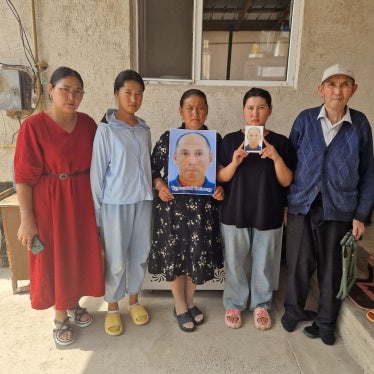Elena Bonner, one of the leading Soviet-era dissidents and champion of human rights in today’s Russia, died at age 88 on June 18. The 40th day after her death, a special time for remembrance in Russia, is July 27.
by Jeri Laber
I traveled to Moscow in September 1979 with a suitcase full of down clothing intended for rights activists sentenced to hard labor in Siberia. I also carried one precious phone number of people I did not know – Elena Bonner and her husband, the Noble-Prize-winning physicist Andrei Sakharov.
Officially, I was in Moscow with a group of publishers attending the Moscow Book Fair. Unofficially, I was there to tell the persecuted members of the Moscow Helsinki Group that they were not alone – that we had formed the US Helsinki Watch Committee (which would ultimately become Human Rights Watch) in order to support them and work with them in exposing the Soviet government’s repressive policies.
I arrived at the Sakharov apartment bearing a priceless gift – photographs of their children and grandchildren who lived in Boston, Massachusetts. Watching the intense joy with which the Sakharovs studied the faces of the grandchildren they had never met, I felt outraged once again by the cruelty of a government that prevented this family, and others like them, from traveling to see their loved ones or communicating with them by mail or phone. Soviet citizens, under Leonid Brezhnev’s rule, were completely cut off from contact with the outside world: phones were tapped, mail was censored, radio and television reception was jammed, and visas for travel were denied.
Elena Bonner agreed to arrange a meeting for me with the Moscow Helsinki Group. She told me that as soon as I met with the group I would be followed and harassed by the secret police, and advised me to delay the meeting until the end of my stay in Moscow. The meeting took place in the Sakharov apartment on my last day in Moscow. I brought my suitcase with me and went straight to the airport, and home, when the meeting was over.
And who were these people with whom it was so dangerous to meet? There were about a dozen of them, mainly women and mostly elderly. All the younger, active leaders of the group – like Yuri Orlov, Anatoly Shcharansky, and Aleksandr Ginzburg – had been arrested and sentenced to long terms of hard labor and exile. Their crime? Merely reporting the persecution of others.
I assumed that the people I met with in Moscow had been spared arrest, either because they were famous, like the Sakharovs, or because they were elderly or women. But I was wrong. Within months, many of them had been arrested, too. The Sakharovs were exiled to the closed city of Gorky where they lived under virtual house arrest. As for me, all my subsequent requests for visas to enter the Soviet Union were denied by the Soviet government. It would take eight years and a change of leadership before I could return to Russia.
When Mikhail Gorbachev came to power in the Soviet Union, the reforms began. One of the first indications of change came in October 1985 when Elena Bonner was given permission to leave Gorky for heart surgery in Boston. On May 12, 1986, the tenth anniversary of the founding of the Moscow Helsinki Group, there was a joyful reunion at Human Rights Watch headquarters between Elena Bonner, just recovering from a six-bypass heart operation, Anatoly Shcharansky (now renamed Natan Sharansky) who had been released from prison in exchange for an American-held Soviet spy, and Ludmilla Alexeyeva, one of the founding members of the Moscow group who had been living in the United States as their representative abroad. It was the first time they had all been together since 1977.
Elena Bonner explained that her position in the Moscow group had at first been merely symbolic. She had given her name to indicate that Sakharov supported the group. “Then it happened,” she said, “some people were arrested, some left…I was forced to become fairly active…and it reached the point where I held the annual political prisoners’ day press conference on October 31, 1983, all by myself.” Such was her loyalty and her courage.
Of my subsequent meetings with Elena Bonner, one stands out in my memory. I was in Moscow in June 1990, a year and a half before the collapse of the Soviet Union. Roslyn Carter had joined our group; she was interested in meeting some of the Moscow human rights heroes who had returned from the gulag. Elena Bonner invited us both to tea.
It was my first visit to Elena Bonner’s apartment since the death of her husband on December 14, 1989. The familiar living room was filled with flowers and photographs of the famous scientist-dissident-statesman; it seemed like a shrine, suffused with a sense of loss for the extraordinary man who died at such a crucial time in his country’s evolution.
But Elena Bonner was not the “grieving widow,” nor was this a traditional ladies’ tea. She had invited three other guests – a journalist, a free-lance writer, and a recently elected member of the new parliament. They were there to tell us about the country’s egregious internal refugee problem, the magnitude of which the government refused to acknowledge. As always, Elena Bonner was ahead of her time, focused on a problem that would only intensify as the years went by.
She was strong, focused, and committed and remained so throughout her long life, holding fast to her own views, even when they ran counter to those of others she respected. A woman always true to herself, a life of activism and dedication. I am proud to have known her.
Jeri Laber is one of the founders of Human Rights Watch








